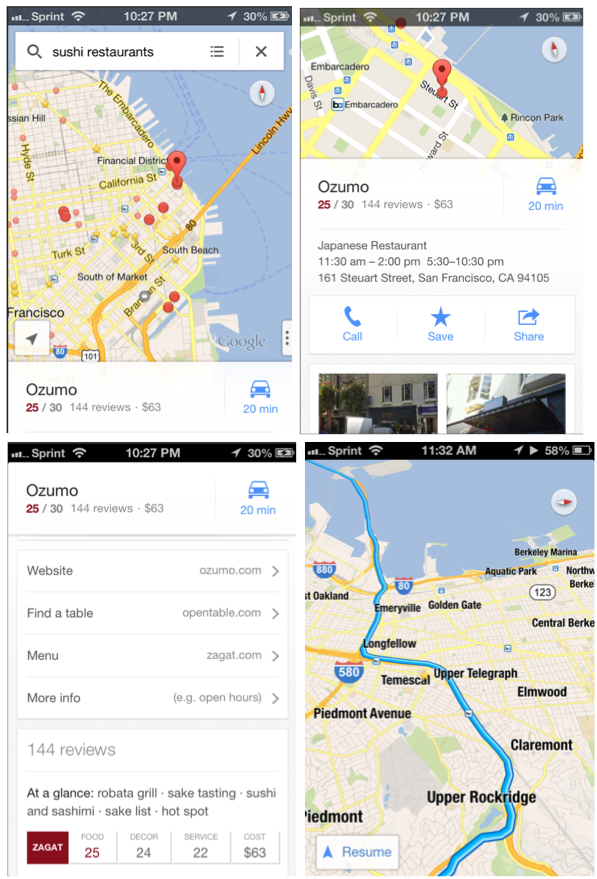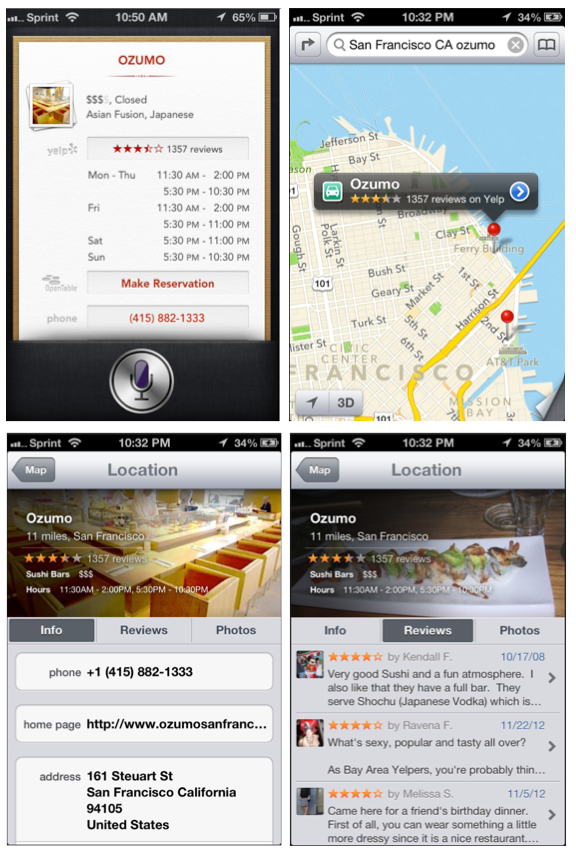Apple Vs. Google Maps: Reality Check Time
Google Maps new iOS app is terrific — although initiating navigation isn’t as intuitive as it might be. But I’ve found that Apple Maps is as good or nearly as good, at least in the San Francisco Bay Area. I have not had a chance to test maps apps side-by-side in other regions. Here’s what […]
Google Maps new iOS app is terrific — although initiating navigation isn’t as intuitive as it might be. But I’ve found that Apple Maps is as good or nearly as good, at least in the San Francisco Bay Area. I have not had a chance to test maps apps side-by-side in other regions.
Here’s what can be said from my experience of the comparison this past weekend:
- Google Maps offers more local data on the map when doing a category search. It also does a somewhat better job with the “local search” experience overall when the map is the entry point
- Google’s local business profile pages offer more information, although Apple’s profile pages are good and may be sufficient for most purposes
- Google’s new horizontal scrolling makes it easer to move between businesses than by tapping dots or pins on the map, as you still must do with Apple Maps
In some situations, however, Siri-based local search and directions offer an advantage over Google Maps. But you can also use Siri to launch Google Maps (“open Google Maps”). What I found most interesting however is that, on four separate trips of different lengths and degrees of complexity, Google and Apple Maps used identical routing.
What I also discovered is that you can run them on top of one another simultaneously. In other words, both will work and speak back to you — most of the time without talking over one another. You can thus use each mapping app to check or verify the navigation offered by the other. (Most people won’t do this or would find it irritating.)
Google was somewhat more “talky” than Apple Maps in most cases, providing more frequent verbal updates. In a few instances Apple was more “literal” than Google, repeating formal geographic markers or signage verbatim, where Google was somewhat more “colloquial.”
Both apps worked well and were pretty error free in getting me from A to B last weekend. As I indicated, in these four tests around the SF Bay Area, the routes were identical. And when I deviated or declined to follow their routing, both systems quickly re-routed me.
In other cities or countries there may be more of a gap between the two services. I didn’t experience it however in my tests.
By the way, the Wall Street Journal’s personal tech columnist Walter Mossberg’s review of Google’s native Maps app for iOS has come out. It praises the design and user experience; both compliments are well deserved.
Mossberg repeats the Google-conveyed (and impressive) stat that 10 million Google Maps downloads happened in the first 48 hours after its launch on iOS. And today there’s discussion about how the remaining non-iOS 6 iPhone cohort made the operating system upgrade given that they now won’t be “stuck” with Apple Maps.
Apple’s Maps were never as bad as the hyperbolic blog posts and well-publicized errors made them out to be. And Google’s Maps were never as flawless as the romantic, recent writing about them has suggested.
Google has been at mapping considerably longer and has more people dedicated to making its local and mapping services work well. Maps and Android are probably the company’s two most important properties after search.
Apple hasn’t devoted anything like the kind of attention and resources to maps that Google has (“hundreds of millions of dollars”) for a period of years. However Apple Maps will continue to improve. We should see also some interesting developments as Apple more fully embraces its new role as a local search and mapping provider.
The fact that Google Maps is back on the iPhone (and soon the iPad) is a great development — for everybody but perhaps Google and Apple’s competitors.
Opinions expressed in this article are those of the guest author and not necessarily Search Engine Land. Staff authors are listed here.
Related stories
New on Search Engine Land

